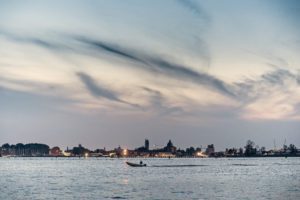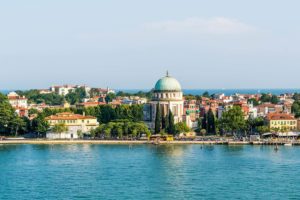An environment immersed in the exclusivity and luxury of its hotels, experienced by stars of the world cinema's history.
At the end of the nineteenth century, the Venice Lido began its ascent as a summer destination of choice for the European aristocracy. The Lungomare Marconi has made the Lido of Venice famous across the world: here, the Palazzo del Cinema and the Palazzo del Casinò overlook the seafront, as symbolic venues of the Venice International Film Festival. And, again on the Lungomare Marconi, two guardians of the memory of the Lido stand out as a holiday destination for aristocrats from the whole of Europe: the Hotel des Bains and the Hotel Excelsior. Its bathing establishments were awarded at the Turin National Exhibition as the most modern of the time, and today, walking along the waterfront, you can still see, lined up in order along the luxury beaches, the iconic “capanne” (huts), now part of the Lido landscape.
THE MAGNIFICENCE OF THE ‘900
Two of the most famous luxury hotels also overlook the Lungomare, bygone observers of the island’s golden age: the first to be found on the promenade from the dock of S. Maria Elisabetta is the Des Bains, opened in 1900, an innovative hotel at the time: avant-garde and equipped with unparalleled comfort. It is a hotel with an unfortunate history, definitively closed after the flood of 1966, but now it may be reopened thanks to a restoration project.
The second is the Excelsior, built to become the most luxurious hotel in the world and famous because, in August 1932, it hosted the first edition of the Venice International Film Festival on its terrace.
THE MOST ENVIED BUILDINGS
And, in fact, the Lungomare Marconi is world famous, because between late August and early September, it hosts the glamorous guests of one of the world’s most famous red carpets. In front of the sea stands the Palazzo del Cinema, opened in 1937 and the heart of the Festival since its fifth edition. It is flanked by the Palazzo del Casinò, which, behind a severe façade, regaled its guests with a sparkling and precious interior until the nineties, when it stopped operating as a Casino and became one of the venues of the Film Festival.
“Entering the Palazzo del Cinema at the Venice Film Festival was like passing a final exam.”













